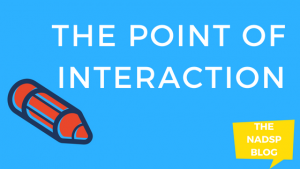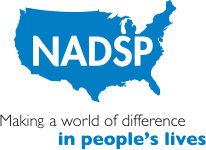
There are no simple solutions or a silver bullet to solve these challenges. They are complex issues, that will require all of us to work together to address things like inadequate wages & rate setting structures, lack of occupational recognition and the need for recognized career ladders. As the name of this blog suggests, the “point of interaction’ is critical to supporting people with disabilities to live rich, fulfilling and dignified lives in the community of their choice. Therefore, I challenge everyone who’s reading this blog to recognize that workforce advocacy is a priority and to affect change, the advocacy needs to include direct support professionals. Indeed, it needs to be led by direct support professionals.
So how can we engage direct support professionals to take this lead when 45% of them turnover annually and most of those who remain are busy working another job, or two? Obviously, this is a major challenge and it won’t be easy, but I think we need to begin with education and addressing these questions:
Do direct support professionals understand that they are part of the fastest growing occupation in the country?
Do direct support professionals have a true understanding of their role as the key lynchpin to quality?
Do direct support professionals have a world view that sees the bigger picture as a social justice issue?
Do direct support professionals understand healthcare financing and how the money they earn comes from Medicaid and when they spend their paychecks they are reinvesting that Medicaid money back into the local economy?
Do we share public policy initiatives with, and engage, direct support professionals to take action?
Do we invest in their future with high quality professional development activities?
Are direct support professionals aware that they are providing complex skills in multi-disciplinary domains that require sound decision making ability and rooted in a code of professional ethics?
As I look at the calendar, summer seems to be flying by quickly. September will be upon us before we know it and National Direct Support Professional Recognition Week is only a short 60 days away (September 9th – 16th). We love the recognition that is bestowed upon direct support professionals during that week, but I think we need to take another look at “recognition”.
This year, the National Alliance for Direct Support Professionals will be changing our efforts around National Direct Support Professional Recognition Week. I can assure that every direct support professional with whom we have contact will have the answers to the above questions because I believe that part of recognition is that direct support professionals need to recognize their part in creating change and we will begin to support them in developing their leadership.
It’s time to raise the bar for direct support professionals.
Thanks for reading,
Joe

Countdown to DSP Week!
Day(s)
:
Hour(s)
:
Minute(s)
:
Second(s)


I couldn’t agree with you more. They need more than a week of thank you and acknowledgements, they need to feel that people really are investing, advocating and really respecting them and what they are doing. And they need more than promises they need actions!
Good morning Joe!
Very great piece and presentation when we met yesterday at the Cohort 2 FLS at Ability First. I shall be following you and hope that you can be my mentor in Public Speaking in this field. I believe this is where my strength and passion lies. Thank you and God’s speed!
Thanks for this entry! I would like to be able to cite a source for the 45% turnover statistic you mentioned. Can you point me toward any demographic stats you might have on DSPs? I’m a DSP in central Kentucky looking for ways to bring more professionalism to our field. – Michael Evces MA